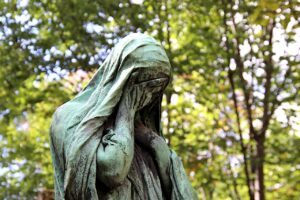
The philosopher Judith Butler has developed a concept they call “grievability” – the idea that if someone is grieved when they die, it means their life was considered worth living. In particular, not just by family and friends, but as a generally acknowledged loss, noticed by the dominant society. While Butler does not, to my knowledge, quote Joni Mitchell, you don’t know what you’ve got till it’s gone – but sometimes not even then. For Butler, grievability can be a useful marker of social and economic inequality – “disposable” people are, by definition, not grievable. Who grieves something that was meant to be thrown away?
I have been thinking recently about the dehumanisation problem we are all facing, and how it makes the people on “the other side” not grievable. I’m reminded of a terrible story, one of many terrible stories from the Rwandan genocide, in which a Tutsi woman, one of the targets of the genocide, gave birth by the side of the road, and a Hutu woman killed her newborn, calling it a cockroach. When we see so many Palestinian children killed and maimed, and do nothing to stop it, how are we any better?
Butler says1: I have argued that it is not possible to understand social inequality without understanding how grievability is unequally distributed. That unequal distribution is a key component of social inequality, one that generally has not been taken into account by social theorists. It follows that the designation, whether explicit or implicit, of a group or population as ungrievable means that they can be targeted for violence or left to die without consequence.
In their book, Butler was actually talking about vulnerable people during a pandemic, but the same applies to any population which can be harmed without consequence. There is no lack of those in our world, sadly. While the Palestinians are foremost in my mind today, this paragraph could be applied to the people of the Congo struggling with mpox, to the victims of civil war in Sudan, or to the people of Tootinaowaziibeeng Treaty Reserve in Manitoba or Flint, Mich., who still have no clean drinking water.
Until the day when we can truly declare every human being in the world to have been made in the Image of the Divine, and to be every bit as precious as any other, there will be no justice, and therefore no peace.
My father, of blessed memory, used to quote Rabbi Tarfon2, who said, It is not your duty to finish the work, but neither are you at liberty to neglect it. Let us each do our part to make humanity more grievable every day.
- Butler, Judith, What World Is This? A Pandemic Phenomenology, Columbia University Press, New York, 2022, p 93.
↩︎ - https://www.sefaria.org.il/Pirkei_Avot.2.16?vhe=Torat_Emet_357&lang=bi&with=all&lang2=en
↩︎
